Key takeaways:
- Preparation is crucial; a solid practice routine helps manage performance anxiety and unexpected challenges.
- Engage with the audience through eye contact, questions, and sharing personal stories to enhance connection.
- Implement coping strategies like deep breathing and positive self-talk to manage nerves before and during a performance.
- Reflect on performances afterward to gain insights and continually improve for future gigs.
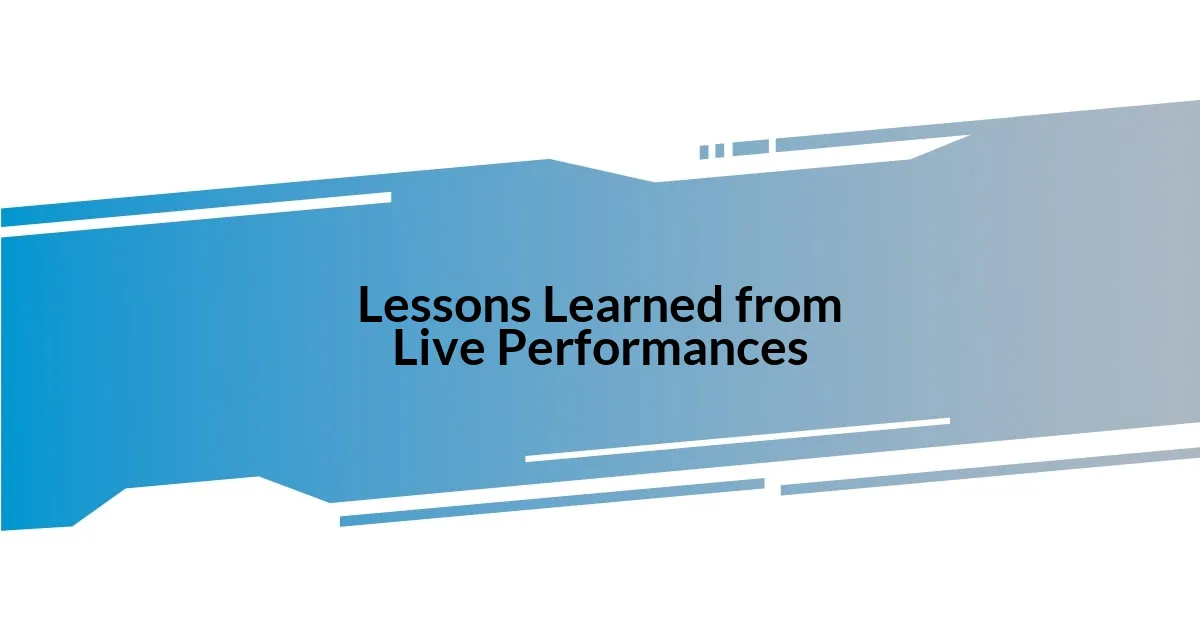
Lessons Learned from Live Performances
One of the biggest lessons I took away from my first live performance was the importance of preparation. I remember standing backstage, heart racing, and feeling completely unprepared despite having rehearsed countless times. The energy from the audience is electric, but it can also be overwhelming; I learned firsthand that having a solid practice routine can make all the difference when those lights start shining.
Another insight I gained was the need to stay present. During my set, I caught myself worrying about hitting all the right notes instead of connecting with my audience. It hit me that music is as much about emotions and storytelling as it is about technical skills; if I’m not in the moment, how can I expect my audience to be? Have you ever been caught up in your thoughts while trying to perform?
Lastly, I discovered the power of adapting in real time. Mid-performance, I faced an unexpected equipment failure—my guitar went silent! In that split second, I had to switch gears and engage with the audience in a way I hadn’t planned. This taught me that flexibility is crucial; sometimes, the best moments stem from unscripted chaos. Have you ever had to think on your feet in a high-pressure situation? I certainly wouldn’t trade that experience for anything.
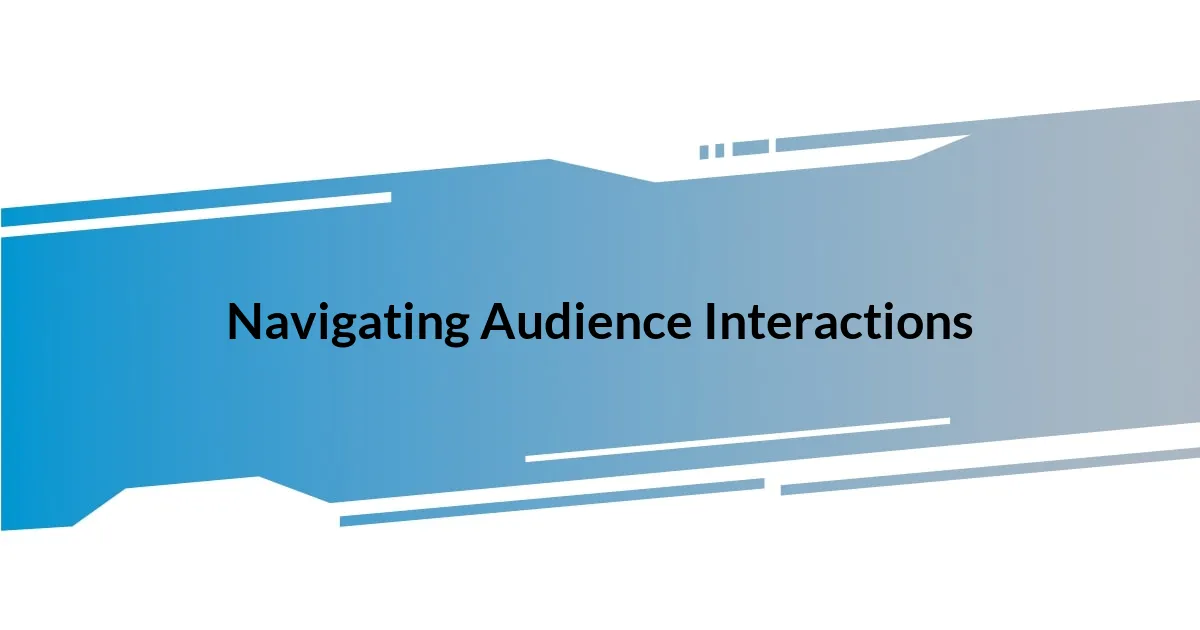
Navigating Audience Interactions
Navigating audience interactions can initially feel daunting, but it’s an integral part of a live performance. I distinctly remember the moment I first locked eyes with a fan in the front row; their excitement was infectious. I decided to engage with them directly, asking where they were from and what songs they loved most. It transformed my experience, making me realize that a genuine connection can elevate the whole atmosphere.
- Read the room: Take a moment to gauge the audience’s energy. Are they engaged or distracted? Adjust your performance accordingly.
- Ask questions: Involve your audience by asking simple questions or prompting them to sing along. It breaks the barrier between performer and listener.
- Be responsive: If you notice a specific reaction, adapt your setlist on the fly. I once shifted to a slower song after sensing a sentimental vibe; the crowd’s response was incredible.
- Share personal stories: Connecting through anecdotes can make your performance feel intimate. I shared a funny story about my first guitar lesson, which had everyone in stitches.
- Maintain eye contact: It fosters a deeper connection. I found that locking eyes with audience members made them feel seen and appreciated.
In my experience, those precious moments of interaction often resonate the most. They remind me that I’m not just performing; I’m sharing an experience with the audience. What I learned is that the more authentic and engaging these interactions are, the more memorable the performance becomes for both me and my audience.
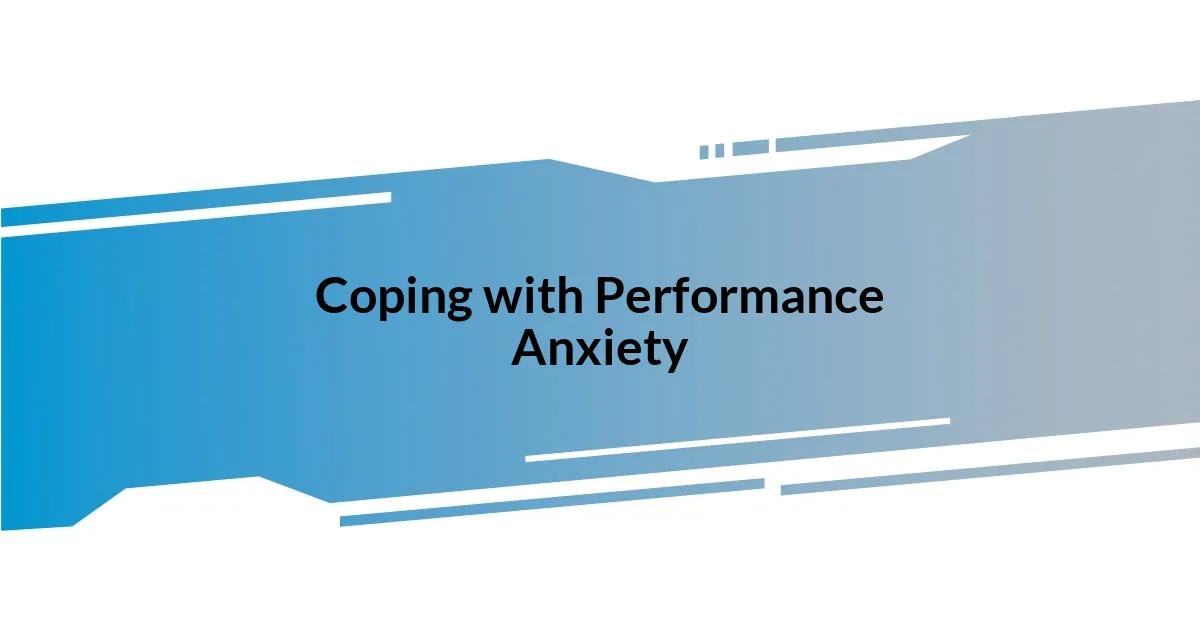
Coping with Performance Anxiety
Coping with performance anxiety is something I really had to navigate during my first gig. It felt like a tidal wave crashing over me—my palms were sweaty, and my mind raced with self-doubt. One effective strategy I discovered was deep breathing. Before taking the stage, I practiced inhaling slowly for four counts, holding for four, and exhaling for six. This calming technique helped ground me, allowing my thoughts to settle and embrace the moment. Have you ever tried something simple like that to calm your nerves?
Another valuable lesson was the importance of positive self-talk. I remember pacing backstage, rehearsing affirmations like, “I am prepared,” and “This is my moment.” Shifting my internal dialogue from worry to encouragement was transformative. It’s fascinating how a few kind words to yourself can shift your mindset. Next time you feel anxious, try to replace those negative thoughts with affirmations. Have you ever noticed how powerful your inner voice can be?
Lastly, I found it helpful to remember that the audience is rooting for you. During my set, when I stumbled on a lyrical line, instead of panicking, I told a lighthearted story about how I used to mess up in my practice sessions. The laughter and encouragement from the crowd reminded me that we’re all human; they wanted to enjoy the show with me, flaws and all. It’s moments like these that make performing feel less like a solo act and more like a shared experience. Have you ever felt that kind of support from an audience?
| Tip | Description |
|---|---|
| Deep Breathing | Calm your nerves by inhaling for four counts, holding for four, and exhaling for six counts. |
| Positive Self-Talk | Replace negative thoughts with affirmations like “I am prepared” or “I am ready to shine.” |
| Embrace Mistakes | View mistakes as a chance to connect with your audience, sharing lighthearted stories if needed. |
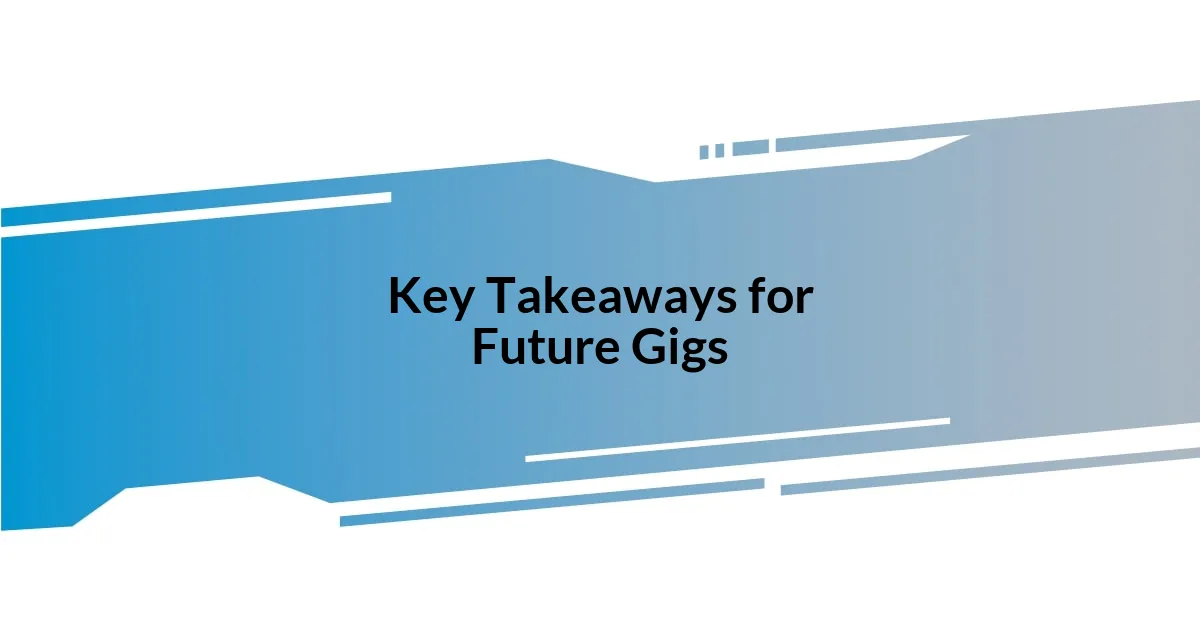
Key Takeaways for Future Gigs
One of the most important takeaways from my first gig was understanding the value of preparation. I always thought I knew my set inside and out, but nothing prepares you for the unexpected on stage. I remember the moment when my guitar string snapped mid-song. Instead of panicking, because I had practiced switching to another instrument, I smoothly transitioned and kept the energy alive. Have you ever had to pivot on the spot? It reminded me that flexibility in my preparation is just as vital as perfecting my performance.
Another key lesson was the power of a supportive network. Prior to my gig, I felt a mix of excitement and dread. I reached out to some musician friends who had been through similar experiences. They shared their own fears and tips, which lifted my spirits immensely. I realized that connecting with fellow artists not only helps reduce anxiety but also builds a sense of community. Have you found strength in your circle when facing your own challenges?
Finally, never underestimate the impact of reflection after each performance. I took some time afterward to jot down notes about what went well and what I could improve. It’s like having a conversation with myself about my growth. In that process, I uncovered personal insights that I might not have noticed in the moment, like my tendency to rush at the beginning. By looking back, I’m better equipped for the next show. Have you ever learned something valuable by simply taking a moment to reflect?
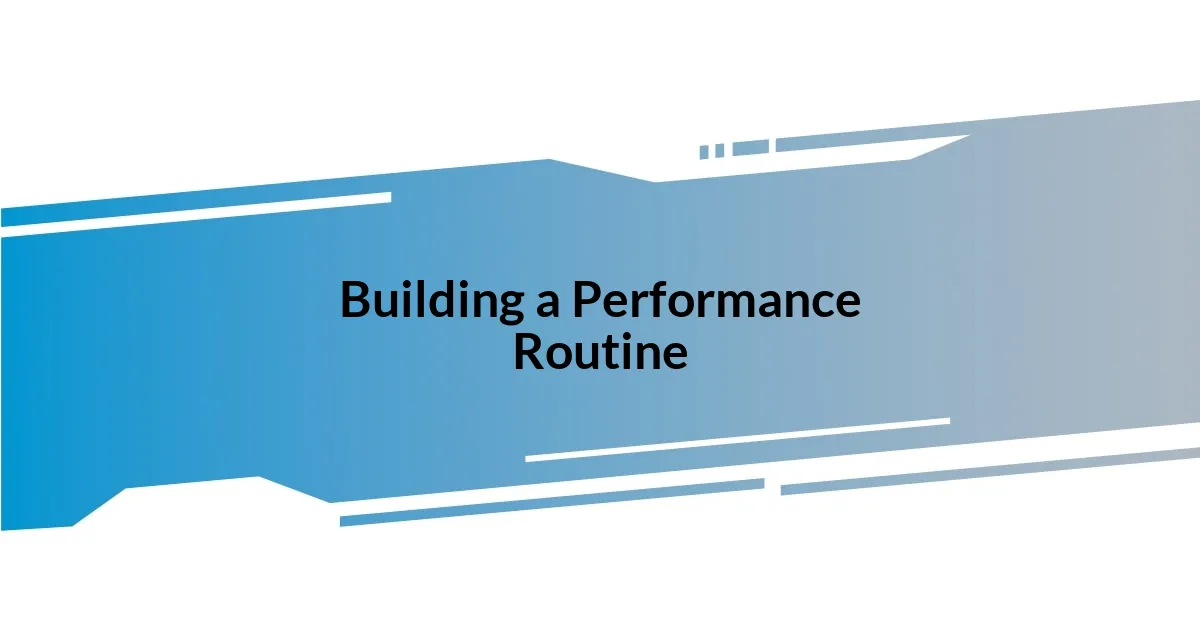
Building a Performance Routine
Creating a solid performance routine is essential for anyone stepping on stage. I learned the importance of warm-ups firsthand. One night, I skipped my vocal exercises, thinking I could just wing it. When I hit the first high note, my voice cracked, and I felt embarrassed. From that experience, I realized that a warm-up is not just a formality—it’s a crucial part of preparing both mentally and physically. Have you ever overlooked something that turned out to be vital for your performance?
I also found that establishing a pre-show ritual fosters a sense of calm and readiness. For me, it often involves a quiet moment with my guitar, tuning into the music while visualizing my set. This little act of connection centers me, helping to transform pre-gig jitters into excitement. I remember feeling the shift in my energy one evening—by the time I walked on stage, I felt empowered rather than anxious. What rituals do you have that bring you peace before a big moment?
Lastly, I discovered the value of a consistent post-performance routine. After my first gig, I took time to unwind and process the experience. I made it a point to jot down my feelings, from the thrill of the performance to the moments I wish had gone differently. This routine allows me to celebrate the highs and learn from the lows, turning every gig into a stepping stone for improvement. How do you typically reflect after a performance, and what insights have emerged from those reflections?